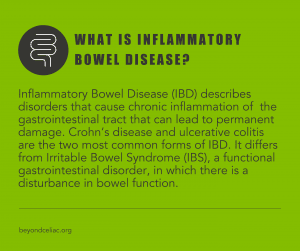And IBD increases risk of celiac disease

By Amy Ratner, Medical and Science News Analyst
People who have celiac disease are at greater risk of also having inflammatory bowel disease, according to a study that reviewed previous research on the connection between the two conditions.
Likewise, people with IBD have an increased risk for celiac disease, though to a lesser degree, the study by researchers from McMaster University, Ontario, Canada, found.
Celiac disease patients were nine times as likely to also have IBD compared to controls, while IBD patients were 3 times more likely to have celiac disease compared to controls, according to the study, which was published in the journal, Gastroenterology.
In 100 people with celiac disease, about three would be also have IBD while about one person in 100 with IBD would also have celiac disease, according to calculations based on study results.
 When patients with celiac disease or IBD do not respond to the usual treatments for either condition and continue to have symptoms, physicians should consider the other disease as a potential reason, the study says.
When patients with celiac disease or IBD do not respond to the usual treatments for either condition and continue to have symptoms, physicians should consider the other disease as a potential reason, the study says.
“There is a need to determine whether proper treatment of IBD in celiac disease patients will lead to decreased chances of complications,” said lead study author Maria Ines Pinto-Sanchez, MD, associate professor of medicine at McMaster.
IBD in those who have celiac disease could require treatments such as anti-inflammatory medications or immunosuppressants, which lead to better control of inflammation and symptoms, she said. Adjustments in medication doses might be needed in celiac disease patients compared to IBD patients who do not have celiac disease, Pinto-Sanchez added.
Researchers included 65 studies in their analysis. Of those, 30 studies included control groups and had a total of 13.6 million participants, including: 43,000 celiac disease patients and 166,000 IBD patients who had Crohn’s disease, ulcerative colitis or indeterminate colitis.
“Clinicians have always suspected that IBD and celiac disease may be linked, however a clear association was never established,” Pinto-Sanchez said.
The studies included in the analysis were published between 1978 and 2019. They included both adult and pediatric patients and covered a range of geographic locations, though a majority were done in Europe followed by North America and Asia.
Approximately 3 million Americans currently have IBD, according to the Center for Disease Control, and the condition is on the rise. Likewise, about 3 million people in the United States have celiac disease with estimates that 50 to 80 percent are undiagnosed.
Crohn’s disease and ulcerative colitis are inflammatory bowel diseases that cause chronic inflammation and damage in the gastrointestinal tract, according to the Crohn’s and Colitis Foundation. While the exact cause of IBD is not entirely understood, it is known to involve an interaction between genes, the immune system, and environmental factors, characteristics also found in celiac disease.
Diarrhea, weight loss and fatigue are symptoms found in both IBD and celiac disease. However, while there are five categories of medications to treat IBD, the gluten-free diet is the only treatment currently available for celiac disease.
They study raises questions about the need for screening for one disease in all patients who have the other, versus testing only patients who continue to be symptomatic despite being treated for celiac disease or IBD.
“Our review has confirmed that there is a strong association between celiac disease and IBD, but at this time, it is unclear whether screening of IBD should be performed in celiac disease and vice versa,” said corresponding study author Elena Verdu, MD, professor of medicine at McMaster. More research is needed to answer this question, according to the study.
Researchers also concluded that more study of groups of celiac disease and IBD patients are need to assess the risk of specific biomarkers, or measurable indicators, for each disease in the other.
Read more about the study here.
Opt-in to stay up-to-date on the latest news.
Yes, I want to advance research No, I'd prefer not to